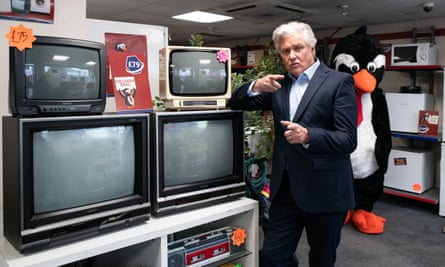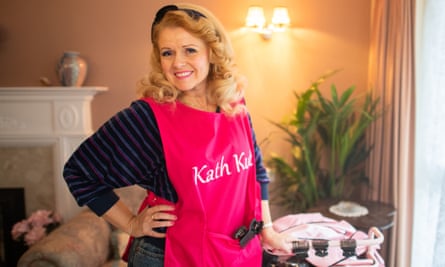The desire for a simpler time when life seemed easier has created enthusiasm for television shows set in the 1980s and 1990s, according to the creator of new BBC One period comedy The Power of Parker.
Set in 1990, the series charts Margaret Thatcher’s slipping grip on power in parallel with one of her supporters – an adulterous, “self-made” rightwing businessman called Martin Parker, played by Game of Thrones star Conleth Hill – who runs a chain of electrical stores in Stockport.
The Power of Parker appears to be part of a trend for 80s and 90s shows, such as The Gold, also on BBC One; A Town Called Malice on Sky; The Curse on Channel 4 and forthcoming reboots of Gladiators and Wheel of Fortune.
Parker’s creator, Paul Coleman, who co-wrote Peter Kay’s Car Share, said people tended to crave nostalgia during hard times. “Times are tough at the minute with the cost of living crisis. Most things you look back nostalgically at you do with rose-tinted spectacles … you remember the good times – there’s a bit of that going on,” he said.

He was a teenager in Bolton in 1990 so looks back with fondness at 90s fashion and music, but said the appeal for younger audiences was partly because “things seemed a bit simpler, because we had less noise. But also because they think, ‘I would’ve been able to pay rent, that would’ve been amazing’, because it’s really impacting that generation.”
Facing uncertainties such as the climate crisis, he said it was perhaps no surprise youngsters are harking back: “I was living through Thatcher at that time and … thinking ‘this is dire’, particularly for northern communities.
“But you do look back and think after what we’ve gone through recently maybe it wasn’t as bad.”
Coleman and his co-writer, the Car Share star Sian Gibson – who plays Martin’s girlfriend Kath – also wanted to set the show in the predigital, low-tech 90s so that Martin could hide his affair more easily.
Gibson said: “It’s much harder to have an affair these days, because of mobile phones – and Facebook – if people think someone’s having an affair they’re straight on Google.”

She said setting it in the 1990s also allowed more leeway to show the casual sexism and misogyny of the time.
“We didn’t want to shy away from that, we wanted to show men like Martin existed,” said Coleman, “What we’ve shown is that the men [were] in control and the women are asking for permission. We’ve moved on so much in so many ways but you also see that men in power still get away with things.
after newsletter promotion
“I think women have more power to speak up a little bit more now, it’s not easy but it was way harder in 1990.”
Gibson said part of the appeal of the show was its 90s music and the attention to detail in the costumes and set the producers Boffola arranged.
She explained: “We really wanted to keep the reality of it. It was 1990s Manchester – it wasn’t all legwarmers and Tiffany.”
Coleman said Boffola sourced 1990s-decorated houses that were for sale to film in and set up such a realistic 90s electrical shop in Stockport that it attracted shoppers.
He said it reflected the fact we “wanted very much to talk about the politics of that time” and “forgotten towns” as well as dying high streets.
The Power of Parker is shown on Fridays on BBC One at 9.30pm and all episodes are available on iPlayer
Join the exciting world of cryptocurrency trading with ByBit! As a new trader, you can benefit from a $10 bonus and up to $1,000 in rewards when you register using our referral link. With ByBit’s user-friendly platform and advanced trading tools, you can take advantage of cryptocurrency volatility and potentially make significant profits. Don’t miss this opportunity – sign up now and start trading!






Recent Comments